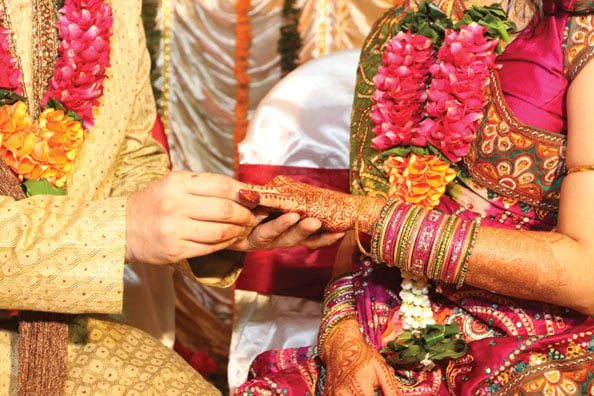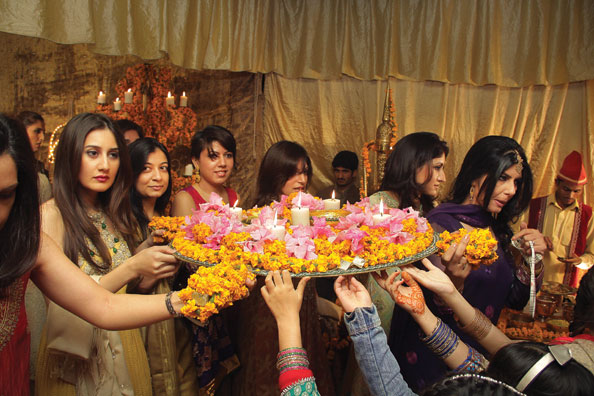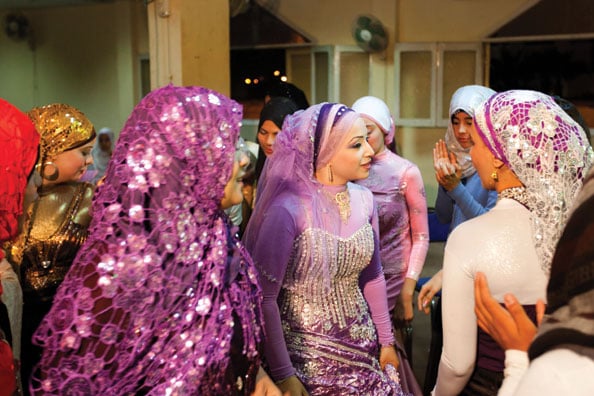Saying I Do is saying yes to a lifetime together, it’s a universal answer to the big question but how it is celebrated is different across the globe. We reveal the varying, but exciting, engagement traditions.
INDIA
Interestingly, in south India, while the bride- and groom-to-be do present each other with engagement rings, they are not actually required to be at the ceremony, with the formality being more of a commitment between the two families. Nevertheless, an essential ritual that is performed in a south Indian engagement ceremony is the exchange of tattu, known as the engagement plate, which includes coconut, flowers, turmeric, betel leaves and betel nuts. Gifts are exchanged and the wedding date and time, known as muhurat, set. Traditionally these dates are based on the couple’s individual horoscopes.
An important north Indian ritual that is performed is the sangeet and tilak. With sangeet meaning music, the event – which is hosted by the bride’s family with the main focus to introduce the bride to all her new family members – revolves around musical entertainment. During the tilak, kumkum (red powder symbolising auspiciousness) is placed on the groom’s forehead by his future bride’s male family members, with an earnest request for him to take care of the bride.
The mehendi ceremony, when the bride receives the application of henna, is crucial in Indian culture as it is a very strong medicinal herb. With emotions running high, the stress of weddings can often cause headaches and fevers, hence the application of the mehendi to cool the body and keep anxiety at bay. An antiseptic agent, the henna can also protect the couple from viral diseases.
On a lighter note, it has also been said that the darker the colour appears on the bride’s body after the application of mehendi, the stronger the groom’s love for her. But best of all, for us at EB anyway, is that once she moves into the marital home, the new bride does not have to participate in any housework until all the dye has completely come off.
PAKISTAN
The wedding is four days long and the engagement prepares you well for each day. This is the final night that the bride and groom are considered single before their wedding. With the formal engagement ceremony involving the exchanging of the ring, in the past the couple would not sit next to each other and the bride’s ring would be placed on her finger by the groom’s next female kin – and visa versa. It has, however, become more customary for the couple to exchange their own rings.
The pair are constantly surrounded by family, especially during specific rituals such as the pithi ceremony when the bride is rubbed with chickpea flour and a turmeric-based paste called pithi, for good luck and beautification before the wedding.
The pithi entails family and friends blessing the bride and groom by performing rituals that include the couple being fed with candy to wish them sweetness in life, having rose petals scattered over them to wish them abundance and bounty of nature, being presented with an envelope filled with money – yes, for wealth and prosperity – and being touched on either side of their heads to ward off bad energy.
Afterwards the bride and groom each stand on a small stool and then step down to break a sapatia. A small clay pot, a sapatia contains lentils symbolising nature, silver coins for material wealth, sugar for sweetness and harmony, and turmeric for good health. It is believed that whoever breaks the sapatia first will rule the house. That’s a tough break if it’s not you.
MIDDLE EAST
The engagement party acts as a family dinner party involving the exchanging of rings.
With the couple turning up to the bride’s home in perfectly colour-coordinated attire, the next significant ritual of the evening involves the prospective groom asking the bride’s father or next of kin for her hand in marriage.
Once the bride’s father agrees, the reading of the Fatiha is traditionally followed for Allah’s blessings and then guests are served sweets and Turkish coffee to guests to rejoice in the bride and groom’s happiness.
Although the engagement does not make what was previously haram, halal, with the pair still considered strangers, they are however now committed to marry each other and – as is the case in most cultures – to break off the engagement without a genuine reason is frowned upon.
Words: Lyndsey Steven and Dalya Bengamin | Images: Getty, Usman Jamshed, Alamy















